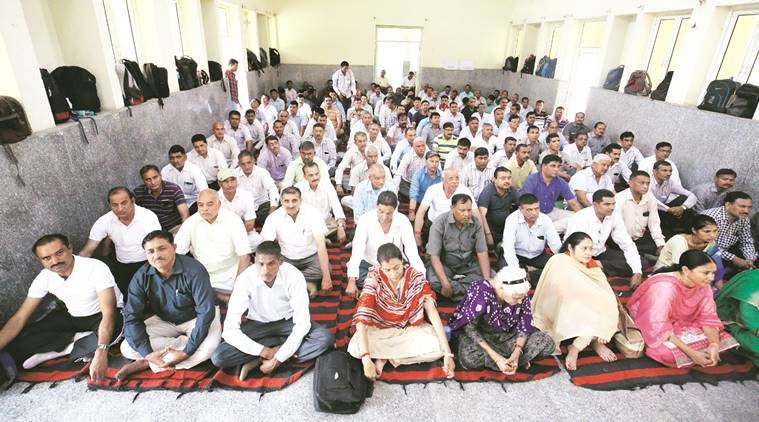 The first session was held at the Community Centre in Model Town, Monday. (Praveen Khanna)
The first session was held at the Community Centre in Model Town, Monday. (Praveen Khanna)
For the past 10 years, a constable thought the voices in his head were “coming from god”. While on patrolling duty in his PCR van, he would take time off to donate a portion of his salary to a local temple after being instructed by “god”.
n For another constable, any PCR call regarding crowd control would make him recoil in fear. He would ask his colleague to attend to the situation and would stay in the PCR van. He wouldn’t even enter lifts for fear of being in a cramped space.
Every day, a sub-inspector with the PCR unit would listen to his colleague talk about how his love affair did not lead to marriage. But he didn’t make much of it. A few months ago, his partner hanged himself — leaving the SI wondering if he could have done something.
These are just some of the instances of PCR personnel, who work 12-hour shifts, being bogged down by stress, anxiety and irritability.
After an ASI-rank officer committed suicide, and amid reports of skirmishes between PCR staff and the public,
Delhi Police have initiated counselling sessions for the over 7,000 PCR staff.
The first session was held at the Community Centre at PCR Lines, Model Town, on Monday.
DCP (PCR) Devender Arya said, “There must be one day where they sit with their friends and talk about issues they face. No senior officers attend these meetings… even if issues of psychiatric illness come to the fore, no punitive action will be taken against them.”
The sessions, moderated by inspector Rakesh Kumar and psychiatric consultant Dr Rajan, were divided in two.
Most personnel spoke about lack of sleep, irritability and issues pertaining to their family. Some policemen also sought private time with the moderators to talk about noticing signs of trouble in their partners.
“There is a thin line between life and death. We are here to look for signs of distress and pull them towards life,” Kumar said.
A constable, who had been living with his nephew for the past few months, said: “My nephew jumped from the first floor of his house. His father had been taunting him and comparing him with his elder brother. Sir, should the boy be treated or his father?”. The psychiatrist dissuaded him from seeking medical treatment for the nephew or his father, and called for a dialogue instead.
Working long shifts has taken its toll on constable Vijay, who started to fight with his family, while constable Rakesh said his wife does not open up about issues because of him being absent for long durations.
Eight women PCR officers who attended the session said that managing family and work meant double the pressure.
“I put in 12 hours of duty, sometimes at odd hours. I do not have an official phone number, and my personal number gets distributed among locals. Smack addicts call me sometimes and this creates problems with my family,” said Rajni, who works at the New Delhi Zone.